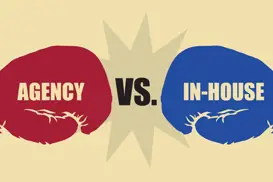How to Hire an Agency: A Step-by-Step Guide
In the ever-evolving business landscape, agencies are your go-to partners for achieving goals, be it through marketing campaigns, website enhancements, or critical project management. Yet, the path to hiring the perfect agency is anything but straightforward. This Aniday's article is your comprehensive guide to navigating the question "how to hire agency?", ensuring you make informed decisions, and ultimately, achieving success.
What is an agency?

An agency is a company or organization that provides professional services to clients. Agencies can provide a variety of services, including marketing, advertising, public relations, design, and development.
Why hire an agency?
Before committing to the agency hiring process, it's vital to understand the specific motivations and scenarios that lead organizations and individuals to seek the services of an agency. Here are some detailed reasons to hire an agency:
-
Expertise and Specialization: Agencies are specialists in their fields, offering a wealth of industry knowledge and skills that may not be available in-house.
-
Cost Efficiency: Agencies provide cost-effective solutions, eliminating the need for in-house salaries, benefits, and overhead costs. You pay for services as needed.
-
Time Efficiency: Agencies excel at project management, often delivering faster results than in-house teams, a critical advantage for time-sensitive projects.
Differences Between Agency and In-House Teams

When it comes to executing projects and achieving business objectives, choosing between hiring an external agency and building an in-house team represents a critical decision. Let's explore the notable differences between these two approaches:
1. Expertise and Specialization
-
Agency: Agencies thrive on diverse projects, bringing a broad spectrum of skills and specialized knowledge from working across industries.
-
In-House Teams: In-house teams develop in-depth knowledge of the company's products or services but may lack exposure to external challenges.
2. Cost Considerations
-
Agency: Agencies often offer cost-effective solutions as clients pay for specific services without the burden of salaries, benefits, and infrastructure costs.
-
In-House Teams: While in-house teams provide continuous support, they come with higher costs, including salaries, benefits, and ongoing operational expenses.
3. Flexibility and Scalability
-
Agency: Agencies provide flexibility, allowing clients to scale services based on project requirements without long-term commitments.
-
In-House Teams: In-house teams offer stability but may face challenges in adapting quickly to changing project scopes.
The Agency Hiring Process

Now, let's embark on the comprehensive journey of hiring an agency, one step at a time.
Step 1: Define Your Needs
-
Define Your Project Objectives: Before seeking an agency, ensure a clear grasp of your goals. Evaluate your project objectives and establish a well-defined plan to guide the agency's efforts.
-
Determine Your Budget and Available Resources: Know your financial limits and what resources you can allocate to the project. A well-defined budget will assist in finding an agency that aligns with your financial capacity.
-
Identify the Required Skills and Services from the Agency: Outline the specific skills, expertise, and services needed from the agency. This ensures you're searching for an agency that can fulfill your requirements.
Step 2: Research and find agencies
-
Investigate Relevant Agencies in Your Field: Start your search by exploring agencies that specialize in your industry or the specific services you need. Compile a list of potential candidates to consider.
-
Utilize Resources Such as Websites, Customer Reviews, and Direct Contacts: Dive into researching potential agencies through their websites, customer reviews, and engage in direct conversations with them. This will provide valuable insights into their capabilities and reputation.
-
Compare and Contrast Potential Candidates: After gathering information on different agencies, compare and contrast their strengths, weaknesses, and suitability for your project.
Step 3: Evaluate and select agencies
When you've identified potential agencies, evaluate them by considering the following factors:
-
Experience: How much experience does the agency have in your industry?
-
Reputation: What is the agency's reputation?
-
Portfolio: Review the agency's portfolio to see their work.
-
Price: Get quotes from several agencies to compare prices.
Step 4: Contract and Negotiation
-
Contract Negotiation: Engage in comprehensive contract discussions, covering terms, conditions, and any project-specific provisions that are vital for success.
-
Mutual Understanding: Ensure both parties have a clear understanding of their respective rights and obligations as specified in the contract.
-
Contract Conclusion: Finalize the contract after agreeing on all terms, ensuring it aligns with both parties' expectations.
Step 5: Project Management
-
Effective Project Management: Establish a strong project management process to keep your project on track, meet deadlines, and optimize resource allocation.
-
Handle Communication and Monitor Progress: Effective communication is essential. Maintain open channels of communication with the agency and closely monitor project progress to identify and address any issues promptly.
-
Ensure Timely and Quality Completion of the Project: The ultimate goal is to ensure the project is completed on time and to the expected quality standards. Be vigilant in your management to achieve this.
Step 6: Performance Evaluation
-
Assess the Agency's Performance Post-Project: After the project concludes, assess the agency's performance. Did they meet your objectives, and how well did they execute the project?
-
Identify Strengths and Areas for Improvement in Future Engagements: Recognize the strengths and weaknesses of the agency's performance. Use this feedback to improve future collaborations with the agency or make more informed decisions when hiring other agencies.
* Additional tips for hiring an agency
You can increase your chances of finding the right agency to help you achieve your business goals by following some additional tips:
-
Budget Clarity: It's essential to be transparent about your budget expectations with the agency, and they will work within those parameters.
-
Expectation Alignment: Prior to contract signing, establish a clear understanding of the project scope, timeline, and budget to ensure everyone is on the same page.
-
Communicate regularly: Keep the agency updated on your progress and any changes to your needs.
-
Be prepared to compromise: It is unlikely that you will find an agency that meets all of your needs perfectly. Be prepared to compromise on some things to get the best overall fit.
Conclusion
Throughout this guide, you've explored a meticulous process for selecting the right agency partner. From defining your project's needs to evaluating performance, every step serves a purpose and contributes to a successful outcome.
By the end of this article, Aniday hopes that you will know “How to hire an agency?”, as well as being well-equipped to make informed decisions, and ultimately, achieving success.
Aniday's HR Services
Headhunting Service
Find and recruit quality candidates in just 1 week! Supported by 40,000 experienced headhunters in IT, Finance, Marketing… capable of recruiting in any region.
Headhunting Service ➔Employer of Record (EOR) Service
On behalf of your business, we recruit employees and handle payroll without the need to establish a company in markets such as Vietnam, Singapore, Malaysia, India, Indonesia…
Employer of Record (EOR) Service ➔